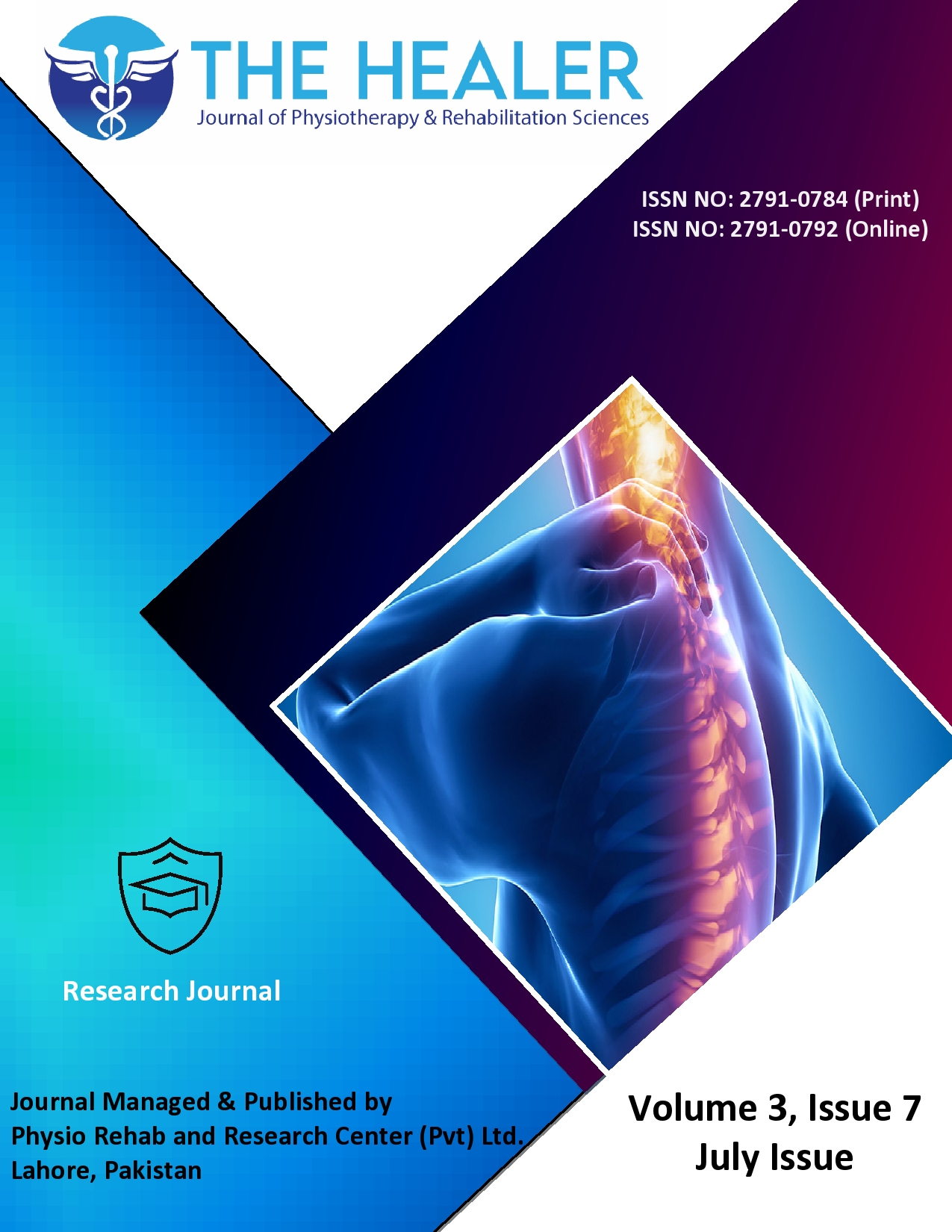Effects of Graded Motor Imagery Techniques on Grip Strength in Female Patients with Colles Fracture
Graded Motor Imagery Techniques in Colles Fracture
DOI:
https://doi.org/10.55735/hjprs.v3i7.165Keywords:
Colles fracture, graded motor imagery, grip strength, patient-rated wrist evaluationAbstract
Background: Colles fracture usually occurs with a fall on an outstretched hand and the post-traumatic complication of this fracture includes loss of grip strength, pain and decreased functional outcome. Objective: To determine the effects of graded motor imagery technique on grip strength in female patients with Colle's fracture. Methods: A quasi-experimental study was conducted on females with the Colles fracture and decreased grip strength. Participants were divided into experimental and conventional groups, with the same baseline treatment based on convenience. Only females with Colles fractures of age 40 to 70 years and those who were conservatively managed were included in the study. Whereas patients with any systematic diseases e.g. rheumatic disease or fracture treated by internal fixation were excluded from the study. A modified sphygmomanometer for assessing grip strength and a patient-rated risk evaluation questionnaire were used. Data was collected using a purposive sampling technique and a sample of 44 was divided into two groups. Patient-rated wrist evaluation and a modified sphygmomanometer were used as data collection tools. The SPSS 20.0 version was used for data analysis. Mean and standard deviation was calculated for group statistics. Active variables were tested with an independent sample t-test. Results: The results of the comparison of experimental and conventional groups, grip strength after six weeks of treatment showed a difference of 66.64 and 43.8 for the conventional group respectively, with a value of p:0.000, showing significant differences in all variables. The results regarding the comparison of groups for patient-rated wrist evaluation were categorized into functional and pain components, mean functional score of wrist joint before and after treatment in the experimental group was M=89.63 and M=37.68 respectively whereas the conventional group showed a lesser reduction with M=88.35 and M= 43.85. After six weeks of treatment, the total score had an average difference of -3.39, with a p-value of 0.543. while the degree of freedom was 40. Conclusion: The findings of this study concluded that the graded-motor imagery technique combined with traditional rehabilitation protocol is effective in improving grip strength in females with Colles fractures.
Downloads
References
Gaya AR, Mello JB, Dias AF, et al. Temporal trends in physical fitness and obesity among Brazilian children and adolescents between 2008 and 2014. 2020.
Barnekow‐Bergkvist M, Hedberg G, Pettersson U, Lorentzon RJSjom, sports si. Relationships between physical activity and physical capacity in adolescent females and bone mass in adulthood. 2006; 16(6): 447-55.
Brogren E, Petranek M, Atroshi IJBmd. Incidence and characteristics of distal radius fractures in a southern Swedish region. 2007; 8(1): 1-8.
Ural A, Zioupos P, Buchanan D, Vashishth DJJob. Evaluation of the influence of strain rate on Colles' fracture load. 2012; 45(10): 1854-7.
MacIntyre NJ, Dewan NJJoHT. Epidemiology of distal radius fractures and factors predicting risk and prognosis. 2016; 29(2): 136-45.
Mauck BM, Swigler CWJOC. Evidence-based review of distal radius fractures. 2018; 49(2): 211-22.
Wang Y-C, Bohannon RW, Li X, Sindhu B, Kapellusch JJJoO, Therapy SP. Hand-grip strength: normative reference values and equations for individuals 18 to 85 years of age residing in the United States.
; 48(9): 685-93.
Bohannon RWJJogpt. Hand-grip dynamometry predicts future outcomes in aging adults. 2008; 31(1): 3-10.
Dilek B, Ayhan C, Yagci G, Yakut YJJoHT. Effectiveness of the graded motor imagery to improve hand function in patients with distal radius fracture: A randomized controlled trial. 2018; 31(1): 2-9. e1.
McGee C, Skye J, Van Heest AJBMD. Graded motor imagery for women at risk for developing type I CRPS following closed treatment of distal radius fractures: a randomized comparative effectiveness trial protocol. 2018; 19: 1-13.
Taylor S-S, Noor N, Urits I, et al. Complex regional pain syndrome: a comprehensive review. 2021; 10(2): 875-92.
Birklein F, Dimova VJPr. Complex regional pain syndrome–up-to-date. 2017; 2(6).
Earley J, PT M. Two treatment options for patients to assist with management of their chronic pain: Multidisciplinary treatment in a supportive class format & Graded Motor Imagery. 2016.
MacDermid JCJHMU. The patient-rated wrist evaluation (PRWE)© user manual. 2007.
Maihöfner C, Speck VJEJoP. Graded motor imagery for complex regional pain syndrome: where are we now? 2012; 16(4): 461-2.
Oyarzún DR, Quintanilla FA, Espinoza HG, Huerta CO, Fritz Y, Poblete LAJRSED. Trial therapy on laterality and motor imagery and selective glenohumeral muscle activation in patients with massive rotator cuff tear: case series. 2018; 25(4): 199-208.
Moseley GLJP. Graded motor imagery is effective for long-standing complex regional pain syndrome: a randomised controlled trial. 2004; 108(1-2): 192-8.
Lee C-H, Lee T-Y, Her J-S, Liao W-L, Hsieh C-LJTJoA, Medicine C. Single-blinded, randomized preliminary study evaluating the effect of transcutaneous electrical nerve stimulation on postoperative pain in patients with Colles' fracture. 2015; 21(12): 754-8.
Martins JC, Aguiar LT, Lara EM, Teixeira-Salmela LF, Faria CDJBjopt. Assessment of grip strength with the modified sphygmomanometer test: association between upper limb global strength and motor function. 2015; 19: 498-506.
Blakeney WGJCiia. Stabilization and treatment of Colles’ fractures in elderly patients. 2010: 337-44.

Downloads
Published
License
Copyright (c) 2023 The Healer Journal of Physiotherapy and Rehabilitation Sciences

This work is licensed under a Creative Commons Attribution 4.0 International License.














